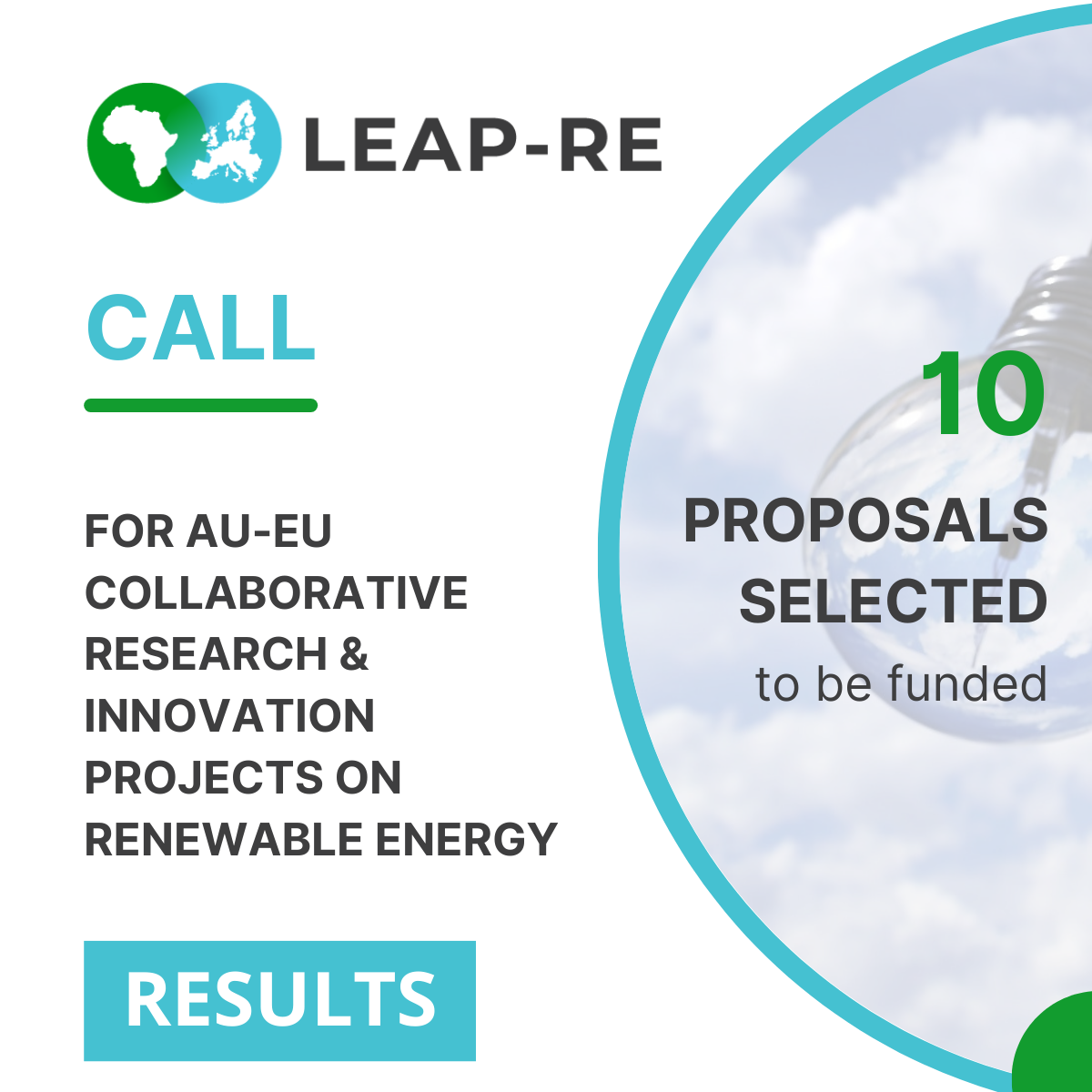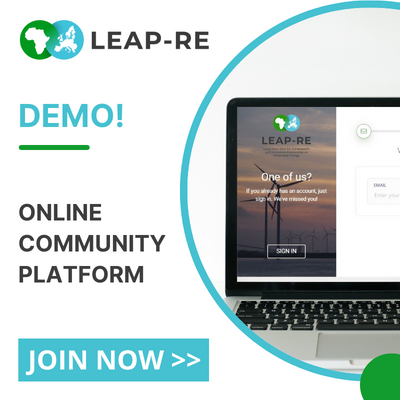In July 2022, LEAP-RE launched its second “Call for AU-EU Collaborative Research and Innovation projects on renewable energy”. 43 applications were received out of which 24 were eligible and invited to submit a full proposal. 10 projects were finally selected for funding after a selection process involving a high-level international review panel and a coalition of funding agencies from the LEAP-RE consortium.
The 10 selected projects consortia gather 75 partners from both continents. Partners come from 7 African countries (Algeria, Egypt, Kenya, Morocco, Nigeria, Uganda, South Africa) and 8 European countries (Austria, Belgium, France, Germany, Italy, Romania, Spain, Switzerland). 76% of partners are from the academic sector –including universities and public research centres– and 24% from the private sector (mainly SMEs). This makes for a quite significant participation from the private sector, as involving private companies in the proposed projects had been encouraged by the funding agencies.
By selecting these project proposals for funding, LEAP-RE strengthens its support to the development of renewable energy sources in order to address both climate change and the need for energy access, two of the biggest challenges Africa faces today. The new projects cover some LEAP-RE thematic priorities, including topics such as the Water-Energy-Food nexus, agrivoltaic solutions, green hydrogen, mini and micro-grids digitalization, and biomass transformation. The 10 project will join the 21 projects that are already part of the LEAP-RE project portfolio.
Meet the 10 selected projects:
- BIOTHEREP: Hybrid biochemical and thermochemical conversion of slaughterhouse biowaste for Renewable Energy production
Coordinator: Mohammed VI Polytechnic University (Morocco). Partners: Ibn Tofail University (Morocco), UKZN – University of KwaZulu-Natal (South Africa), Mangosuthu University of Technology (South Africa), Fountain Green Energy (South Africa), Università degli Studi di Perugia (Italy), HTW Berlin – University of Applied Sciences (Germany), Institut de combustion, aérothermique, réactivité et environnement (France), Centre de développement des Energies Renouvelables (Algeria), Cairo University (Egypt), BioEnergy Berlin GmbH (Germany).
- D3T4H2S: A data driven digital twin for improved hydrogen storage vessels towards challenges for energy transition
Coordinator : S VERTICAL (France). Partners: Université Internationale de Rabat (Morocco), University of South Africa, College of Science, Engineering and Technology, School of Engineering (South Africa), University of Hassan II Casablanca (UH2C) (Morocco), Université Dunărea de Jos (UGAL) (Romania), ENSTA Bretagne (France).
- MIDINA: A comprehensive methodological approach on the development potential of microgrids and the integration of renewable energies in North Africa.
Coordinator: Institut de Recherche en Energie Electrique de Nantes Atlantique (France). Partners: Université de M’sila (Algeria), Technical University of Cluj Napoca (Romania) Université Sidi-Mohamed Ben-Abdellah (Morocco), Université Mohammed V Souissi (Morocco), Atlykas Groupe (Morocco), AOUINA KAMEL (Algeria).
- OPTIMG: Optimizing micro-grids for water-energy-food
Coordinator: Reiner Lemoine Institut (Germany). Partners: University of Cape Town (South Africa), Tshwane University of Technology (South Africa), EnGreen Solutions (Italy), Green Energy Park (Morocco), Hassan II University of Casablanca (Morocco).
- RCLIB: Recycling of the cathodes, based on carbon nanotubes and conducting polymers, from spent rechargeable Li batteries
Coordinator: National Institute of Materials Physics (Romania). Partners: IT Center for Science and Technology (CITST) (Romania), Badji Mokhtar University (Algeria), Istituto Nazionale di Fisica Nucleare (Italy), University Cadi Ayyad (Morocco), University Mohammed VI Polytechnic (Morocco).
- REPTES: Renewable plants integrated with pumped thermal energy storage for sustainable satisfaction of energy and agricultural needs of African communities
Coordinator: University of Cagliari (Italy). Partners: Smart City Instruments (Italy), University of Liege (Belgium), Green Energy Park (Morocco), Ecole Nationale Supérieure d’Arts et Métiers Rabat – UM5 (Morocco), Ecole Nationale Supérieure des Mines de Rabat (Morocco), Federal University of Petroleum Resources Effurun (Nigeria), Bucharest University of Economic Studies (Romania).
- SHE: Smart Home Energy: Development of an integrated and mobile solution for low-cost cooking and power generation
Coordinator: Graz University of Technology, Institute of Thermal Engineering (Austria). Partners: Carbon Compass (Austria), EKASI Energy (South Africa), Tshwane University of Technology (South Africa), Institut Mines Telecom IMT Mines Albi (France), Makerere University (Uganda), University Carlos III de Madrid (UC3M) (Spain) own funds.
- SmartAPV-Fruit: Smart Agrivoltaic Systems for Fruits
Coordinator: Fraunhofer Institute for Solar Energy Systems ISE (Germany). Partners: RAACH SOLAR PROJECTS GmbH (Germany), University of the Western Cape (South Africa), FruitsRouges & Co (Agri. coop.) (France), INRA National Institute of Agricultural Research (Morocco), Université Ibn Zohr, Agadir (Morocco), Cadi Ayyad University Marrakech (Morocco), Insolight (Switzerland) own funds.
- SWITCH: Stabilizing weak grids through machine learning: empowering farmers in end-of-line communities in North Africa through artificial neural networks
Coordinator: Technische Hochschule Ingolstadt (Germany). Partners: Women Engage for a Common Future WECF(Germany), University of Adrar (Algeria), University of Ain Temouchent (Algeria), Aitown S.R.L (Italy), Al Akhawayn University (Morocco), University Mohammed Premier (Morocco), Institut National des Postes et Télécommunications (Morocco).
- Vil2Bio: Combining village-scale biogas production with pyrolysis in biomass stoves
Coordinator: Laboratoire De Genie Des Procedes – Environnement – Agroalimentaire GEPEA (France). Partners: Institut de combustion, aérothermique, réactivité et environnement ICARE (France), Altran Technologies (France), Centre de développement des énergies renouvelables (Algeria), Hamburg University of Technology TUHH(Germany), International Biogas and Bioenergy Competence Center (Germany), Kenya Industrial Research and Development Institute (Kenya), University of Nairobi (Kenya), Université Hassan Ier (Morocco), Sultan Moulay Slimane University (Morocco).
The total funding budget of the 10 selected projects is 5.874 Millions €, 4.372 M€ from national funding agencies and 1.502 M€ from the European Commission.




